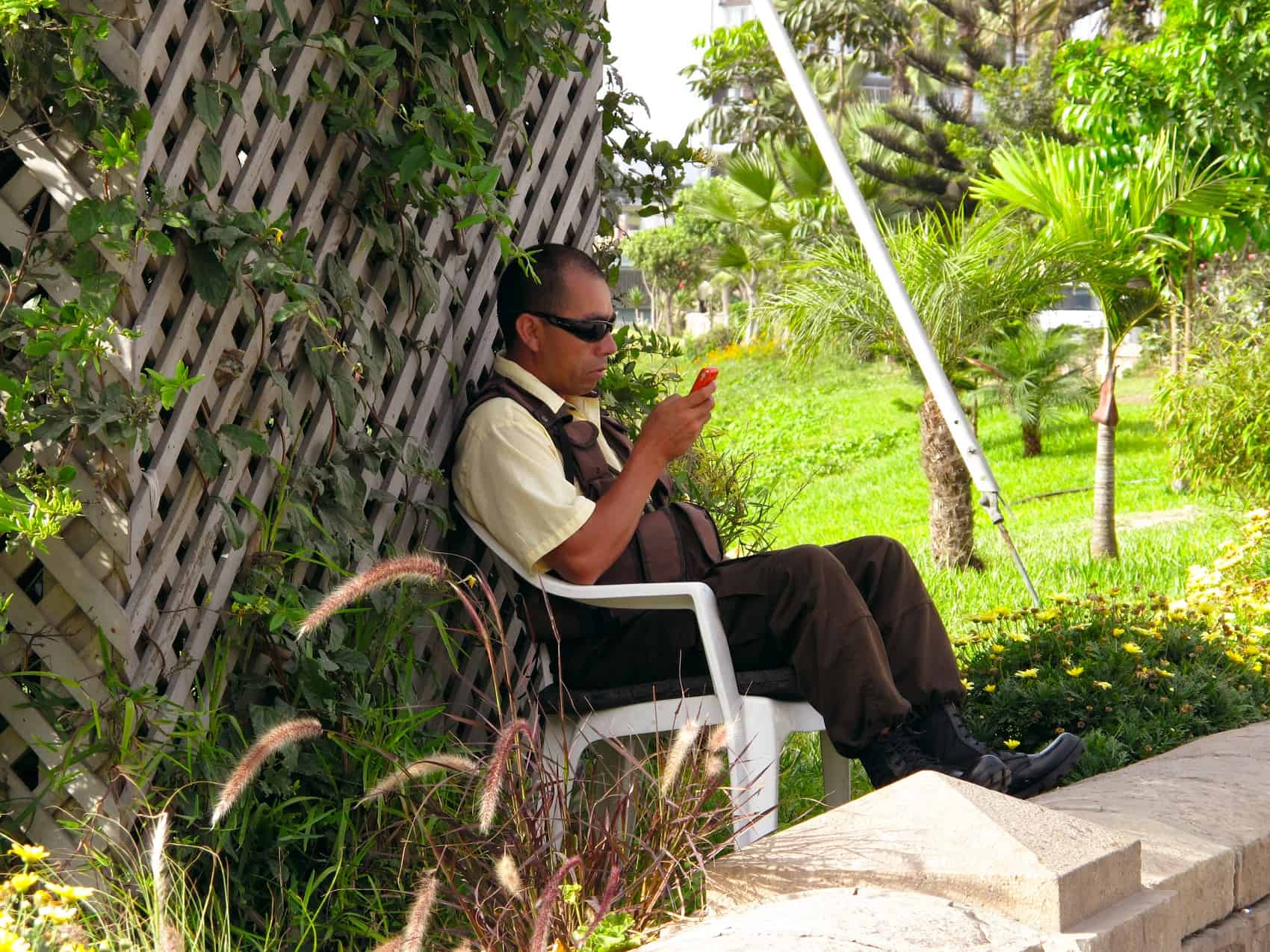Santos isn’t exactly a guachimán. He’s more like a security guard, although he serves roughly the same purpose. Santos is charmingly overweight, with a cherubic face and bright eyes. He is almost always smiling, like a giant toddler. He is oppressively pleasant, and because I am also oppressively pleasant, we greet each other each morning with the enthusiasm of cokeheads.
“¿Hace calor, verdad?” I say, pointing to the sky. It’s warm out, isn’t it?
“¡Oh, sí! ¡Muy bonito! ¡Pura vida!” Santos sings back. Oh, yes! Very nice! Pure life!
Santos hails from León, a city in northern Nicaragua, and like almost every Nicaraguan I’ve met in Costa Rica, he’s unbelievably friendly. When he’s not working or chilling out at home, Santos is an eager fisherman, and he loves to cast reels in Puntarenas on his rare weekends off. With his cappuccino skin and ill-fitting uniform, Santos could easily cameo on a prime-time sitcom—the wacky neighbor, or the gawky relative with a heart of gold. He’s also refreshingly honest: Before I visited Nicaragua, I asked Santos whether I should visit Managua, the capital.
“Oh, Managua!” he said, furrowing his brow. “It’s very dangerous. At night, someone may rob you with a gun. I wouldn’t go to Managua. You should just go to Granada.” And then he closed his eyes and nodded, as if to seal the agreement.
What’s funny about Santos is that he isn’t much of a guard. He has no weapons, not even a whistle. He never checks drivers for ID or asks visitors’ business in our urbanización. The security booth is a kind of placebo—when burglars see Santos, they assume our block is a gated community, even though it’s not. Santos is about as effective as a scarecrow; he keeps criminals away, but he probably couldn’t prevent an actual crime. Given his girth, I wonder if Santos could chase a fleeing mugger for more than a block before collapsing.
This is how many guachimanes are—I have no idea who hires them or how they earn their money. Do they have to train in something? Do they always ask for money, or just sometimes? Is there a standard rate, or is it negotiated on the spot? Does the guachimán have a union, or a club, or even the loosest social network, or do they all fly solo? Is the job even legal, or do shopkeepers just hand out undocumented cash at the end of the day?
The irony is that most guachimanes get hired in upper-class neighborhoods, including mine. My street would seem fairly typical in Miami or Los Angeles, but in Costa Rica, our neighbors live in the equivalent of mansions. We live near a long row of U.S. chains, like Pizza Hut and Taco Bell and Quiznos, and all of their parking lots have private security guards. Indeed, the sentry in front of our local supermarket shoulders a full-fledged shotgun—which will be handy, if a paramilitary group ever storms the organic coffee aisle.
As a full-time pedestrian, I pass my neighborhood’s guachimanes every day, and we have a strangely warm relationship. A leathery 61-year-old named Juan often sees my wife running, and he has invited us to join him on his own jogs around town. Mikhail, who is Santos’ nocturnal counterpart, is a shy Romanian with an estranged wife and child in Germany; on late nights, I often chat with Mikhail for a few minutes in German, and we trade anecdotes about our bizarre expatriate lives. Where drivers see an adversary—a crooked authority figure, a street urchin posing as a sentinel—I see fellow pedestrians. They remind me of the old men back in Pittsburgh, who spend their summers sitting on park benches and watching the traffic go by. They are fixtures of the neighborhood. In a world as cliquey and guarded as Tico culture, a nod and a wave go a long way.
“¡Hola, Robert! ¡Robert de los Estados Unidos!” Santos calls, like a game show host, as I return from work. The sun has melted over the rooftops and power lines, and the sky is a muddy mix of orange and storm clouds. “¿Pura vida?” he asks.
“Pura vida,” I say.
“¡Oh, muy bien! ¡Excelente!”
After living in Costa Rica for only a few months, I couldn’t imagine Santos not there. Useful or not, he adds a human element to an otherwise impersonal suburb. If Santos were ever fired or replaced, the place would change entirely. The street would be nothing more than a street.






